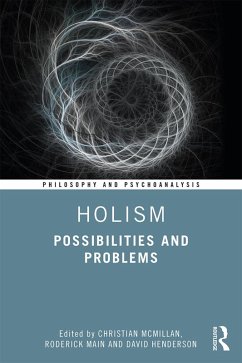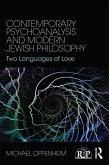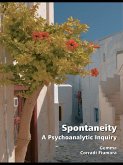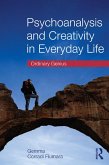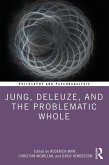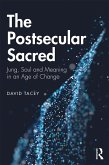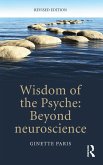Holism (eBook, ePUB)
Possibilities and Problems
Redaktion: McMillan, Christian; Henderson, David; Main, Roderick
38,95 €
38,95 €
inkl. MwSt.
Sofort per Download lieferbar

19 °P sammeln
38,95 €
Als Download kaufen

38,95 €
inkl. MwSt.
Sofort per Download lieferbar

19 °P sammeln
Jetzt verschenken
Alle Infos zum eBook verschenken
38,95 €
inkl. MwSt.
Sofort per Download lieferbar
Alle Infos zum eBook verschenken

19 °P sammeln
Holism (eBook, ePUB)
Possibilities and Problems
Redaktion: McMillan, Christian; Henderson, David; Main, Roderick
- Format: ePub
- Merkliste
- Auf die Merkliste
- Bewerten Bewerten
- Teilen
- Produkt teilen
- Produkterinnerung
- Produkterinnerung

Bitte loggen Sie sich zunächst in Ihr Kundenkonto ein oder registrieren Sie sich bei
bücher.de, um das eBook-Abo tolino select nutzen zu können.
Hier können Sie sich einloggen
Hier können Sie sich einloggen
Sie sind bereits eingeloggt. Klicken Sie auf 2. tolino select Abo, um fortzufahren.

Bitte loggen Sie sich zunächst in Ihr Kundenkonto ein oder registrieren Sie sich bei bücher.de, um das eBook-Abo tolino select nutzen zu können.
The terms 'holism' and 'holistic' arouse strong emotional responses in contemporary culture, whether this be negative or positive, and the essays in this interdisciplinary collection probe, each in its own way, the possibilities and problems inherent in thinking holistically.
- Geräte: eReader
- ohne Kopierschutz
- eBook Hilfe
- Größe: 1.74MB
Andere Kunden interessierten sich auch für
![Contemporary Psychoanalysis and Modern Jewish Philosophy (eBook, ePUB) Contemporary Psychoanalysis and Modern Jewish Philosophy (eBook, ePUB)]() Michael OppenheimContemporary Psychoanalysis and Modern Jewish Philosophy (eBook, ePUB)54,95 €
Michael OppenheimContemporary Psychoanalysis and Modern Jewish Philosophy (eBook, ePUB)54,95 €![Spontaneity (eBook, ePUB) Spontaneity (eBook, ePUB)]() Gemma Corradi FiumaraSpontaneity (eBook, ePUB)41,95 €
Gemma Corradi FiumaraSpontaneity (eBook, ePUB)41,95 €![Psychoanalysis and Creativity in Everyday Life (eBook, ePUB) Psychoanalysis and Creativity in Everyday Life (eBook, ePUB)]() Gemma Corradi FiumaraPsychoanalysis and Creativity in Everyday Life (eBook, ePUB)45,95 €
Gemma Corradi FiumaraPsychoanalysis and Creativity in Everyday Life (eBook, ePUB)45,95 €![Soul-Violence (eBook, ePUB) Soul-Violence (eBook, ePUB)]() Wolfgang GiegerichSoul-Violence (eBook, ePUB)36,95 €
Wolfgang GiegerichSoul-Violence (eBook, ePUB)36,95 €![Jung, Deleuze, and the Problematic Whole (eBook, ePUB) Jung, Deleuze, and the Problematic Whole (eBook, ePUB)]() Jung, Deleuze, and the Problematic Whole (eBook, ePUB)28,95 €
Jung, Deleuze, and the Problematic Whole (eBook, ePUB)28,95 €![The Postsecular Sacred (eBook, ePUB) The Postsecular Sacred (eBook, ePUB)]() David TaceyThe Postsecular Sacred (eBook, ePUB)38,95 €
David TaceyThe Postsecular Sacred (eBook, ePUB)38,95 €![Wisdom of the Psyche (eBook, ePUB) Wisdom of the Psyche (eBook, ePUB)]() Ginette ParisWisdom of the Psyche (eBook, ePUB)31,95 €
Ginette ParisWisdom of the Psyche (eBook, ePUB)31,95 €-
-
-
The terms 'holism' and 'holistic' arouse strong emotional responses in contemporary culture, whether this be negative or positive, and the essays in this interdisciplinary collection probe, each in its own way, the possibilities and problems inherent in thinking holistically.
Dieser Download kann aus rechtlichen Gründen nur mit Rechnungsadresse in A, B, BG, CY, CZ, D, DK, EW, E, FIN, F, GR, HR, H, IRL, I, LT, L, LR, M, NL, PL, P, R, S, SLO, SK ausgeliefert werden.
Produktdetails
- Produktdetails
- Verlag: Taylor & Francis eBooks
- Seitenzahl: 212
- Erscheinungstermin: 6. Dezember 2019
- Englisch
- ISBN-13: 9781000768282
- Artikelnr.: 58348014
- Verlag: Taylor & Francis eBooks
- Seitenzahl: 212
- Erscheinungstermin: 6. Dezember 2019
- Englisch
- ISBN-13: 9781000768282
- Artikelnr.: 58348014
- Herstellerkennzeichnung Die Herstellerinformationen sind derzeit nicht verfügbar.
Christian McMillan, PhD, is Lecturer at West Suffolk College, University of Suffolk, and was formerly Senior Research Officer in the Department for Psychosocial and Psychoanalytic Studies, University of Essex, UK. Roderick Main, PhD, is a professor in the Department of Psychosocial and Psychoanalytic Studies and Director of the Centre for Myth Studies at the University of Essex, UK. David Henderson, PhD, is Lecturer in Jungian Studies in the Department for Psychosocial and Psychoanalytic Studies, University of Essex, UK. He is a member of the British Jungian Analytic Association (BJAA) and the International Association for Analytical Psychology (IAAP).
Introduction: Roderick Main, Christian McMillan and David Henderson; Part
1: History and contexts; Chapter 1: How do we think in terms of wholes?
Holistic voices and visions after World War II, Linda Sargent Wood; Chapter
2: Irreducible responsibility: applying holism to navigate the
Anthropocene, Andrew Fellows; Chapter 3: Georg Ernst Stahl's holistic
organism, Barbara Helen Miller; Part 2: Analytical Psychology; Chapter
4: From the split to wholeness: the 'coniunctio' in C. G. Jung's Red Book,
Alessio de Fiori; Chapter 5: Science as a system: connections between Carl
Gustav Jung's holistic thoughts about science and his Red Book experience,
Armelle Line Peltier; Chapter 6: The holistic wish: migration of feeling,
thought and experience, Phil Goss; Chapter 7: Holistic education: the
Jungian dilemma, Robert Mitchell; Chapter 8: Simondon and Jung: re-thinking
individuation, Mark Saban; Part 3: Philosophy; Chapter 9: A whole made of
holes: interrogating holism via Jung and Schelling, Gordon Barentsen;
Chapter 10: Jung, Spinoza, Deleuze: a move towards realism, Robert Langan;
Chapter 11: Kant's influence on Jung's vitalism in the Zofingia Lectures,
Christian McMillan; Chapter 12: An emergent, critical realist understanding
of holism, Ian Hornsby; Chapter 13: Synchronicity: between wholes and
alterity, Rico Snellee; Chapter 14: Why don't holisms describe the whole?
The psyche as a case study, John Mackey; Part 4: Practice and the arts;
Chapter 15: A synchronistic experience in Serbia, Richard Berengarten;
Chapter 16: The concept of kami in Shint¿ and holism: psychotherapy and
Japanese literature, Megumi Yama; Chapter 17: The CORE Trust: the holistic
approach to addiction, Jason Wright
1: History and contexts; Chapter 1: How do we think in terms of wholes?
Holistic voices and visions after World War II, Linda Sargent Wood; Chapter
2: Irreducible responsibility: applying holism to navigate the
Anthropocene, Andrew Fellows; Chapter 3: Georg Ernst Stahl's holistic
organism, Barbara Helen Miller; Part 2: Analytical Psychology; Chapter
4: From the split to wholeness: the 'coniunctio' in C. G. Jung's Red Book,
Alessio de Fiori; Chapter 5: Science as a system: connections between Carl
Gustav Jung's holistic thoughts about science and his Red Book experience,
Armelle Line Peltier; Chapter 6: The holistic wish: migration of feeling,
thought and experience, Phil Goss; Chapter 7: Holistic education: the
Jungian dilemma, Robert Mitchell; Chapter 8: Simondon and Jung: re-thinking
individuation, Mark Saban; Part 3: Philosophy; Chapter 9: A whole made of
holes: interrogating holism via Jung and Schelling, Gordon Barentsen;
Chapter 10: Jung, Spinoza, Deleuze: a move towards realism, Robert Langan;
Chapter 11: Kant's influence on Jung's vitalism in the Zofingia Lectures,
Christian McMillan; Chapter 12: An emergent, critical realist understanding
of holism, Ian Hornsby; Chapter 13: Synchronicity: between wholes and
alterity, Rico Snellee; Chapter 14: Why don't holisms describe the whole?
The psyche as a case study, John Mackey; Part 4: Practice and the arts;
Chapter 15: A synchronistic experience in Serbia, Richard Berengarten;
Chapter 16: The concept of kami in Shint¿ and holism: psychotherapy and
Japanese literature, Megumi Yama; Chapter 17: The CORE Trust: the holistic
approach to addiction, Jason Wright
Introduction: Roderick Main, Christian McMillan and David Henderson; Part
1: History and contexts; Chapter 1: How do we think in terms of wholes?
Holistic voices and visions after World War II, Linda Sargent Wood; Chapter
2: Irreducible responsibility: applying holism to navigate the
Anthropocene, Andrew Fellows; Chapter 3: Georg Ernst Stahl's holistic
organism, Barbara Helen Miller; Part 2: Analytical Psychology; Chapter
4: From the split to wholeness: the 'coniunctio' in C. G. Jung's Red Book,
Alessio de Fiori; Chapter 5: Science as a system: connections between Carl
Gustav Jung's holistic thoughts about science and his Red Book experience,
Armelle Line Peltier; Chapter 6: The holistic wish: migration of feeling,
thought and experience, Phil Goss; Chapter 7: Holistic education: the
Jungian dilemma, Robert Mitchell; Chapter 8: Simondon and Jung: re-thinking
individuation, Mark Saban; Part 3: Philosophy; Chapter 9: A whole made of
holes: interrogating holism via Jung and Schelling, Gordon Barentsen;
Chapter 10: Jung, Spinoza, Deleuze: a move towards realism, Robert Langan;
Chapter 11: Kant's influence on Jung's vitalism in the Zofingia Lectures,
Christian McMillan; Chapter 12: An emergent, critical realist understanding
of holism, Ian Hornsby; Chapter 13: Synchronicity: between wholes and
alterity, Rico Snellee; Chapter 14: Why don't holisms describe the whole?
The psyche as a case study, John Mackey; Part 4: Practice and the arts;
Chapter 15: A synchronistic experience in Serbia, Richard Berengarten;
Chapter 16: The concept of kami in Shint¿ and holism: psychotherapy and
Japanese literature, Megumi Yama; Chapter 17: The CORE Trust: the holistic
approach to addiction, Jason Wright
1: History and contexts; Chapter 1: How do we think in terms of wholes?
Holistic voices and visions after World War II, Linda Sargent Wood; Chapter
2: Irreducible responsibility: applying holism to navigate the
Anthropocene, Andrew Fellows; Chapter 3: Georg Ernst Stahl's holistic
organism, Barbara Helen Miller; Part 2: Analytical Psychology; Chapter
4: From the split to wholeness: the 'coniunctio' in C. G. Jung's Red Book,
Alessio de Fiori; Chapter 5: Science as a system: connections between Carl
Gustav Jung's holistic thoughts about science and his Red Book experience,
Armelle Line Peltier; Chapter 6: The holistic wish: migration of feeling,
thought and experience, Phil Goss; Chapter 7: Holistic education: the
Jungian dilemma, Robert Mitchell; Chapter 8: Simondon and Jung: re-thinking
individuation, Mark Saban; Part 3: Philosophy; Chapter 9: A whole made of
holes: interrogating holism via Jung and Schelling, Gordon Barentsen;
Chapter 10: Jung, Spinoza, Deleuze: a move towards realism, Robert Langan;
Chapter 11: Kant's influence on Jung's vitalism in the Zofingia Lectures,
Christian McMillan; Chapter 12: An emergent, critical realist understanding
of holism, Ian Hornsby; Chapter 13: Synchronicity: between wholes and
alterity, Rico Snellee; Chapter 14: Why don't holisms describe the whole?
The psyche as a case study, John Mackey; Part 4: Practice and the arts;
Chapter 15: A synchronistic experience in Serbia, Richard Berengarten;
Chapter 16: The concept of kami in Shint¿ and holism: psychotherapy and
Japanese literature, Megumi Yama; Chapter 17: The CORE Trust: the holistic
approach to addiction, Jason Wright
